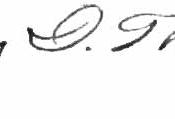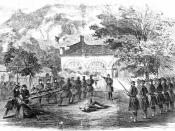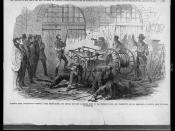The years directly before the civil war were marked by escalating tensions and sharply declining relations between the North and South as differences between the two territories were made clear. John Brown's raid in October of 1859 came at that volatile time and provoked an extreme reaction from the South immediately afterward; as the furious public option of the South was that the entire North had personally supported and condoned Brown and his violent actions in the ultimate quest of abolition. From that point, as feelings in the North and South were pushed to the edge by other events, the views on John Brown and his actions, especially the opinion of the North, also began to change, illustrating the shift toward the worse and changing North-South relations. John Brown, at first regarded as a fanatic abolitionist, rose to heights of heroism and martyrdom as hostility grew and war broke out.
After John Brown's raid on Harper's ferry, the general consensus in the North in 1859 was one of disapproval, especially as the South expressed their indignation and Northerners attempted to mend the rift that had begun to develop. Horace Greeley, in an editorial in the New York Tribune at the time, publicly denounced Brown as a fanatic and his methods unfit, and yet declares his support for abolition (Document A). That same year, Henry David Thoreau, a leading free-thinker and intellectual in the North, publicly celebrated Brown's divergence from human laws to pursue a quest and examined the North's positive reaction to Brown's ideas (Document B). While the North did not quite publicly support Brown's actions, public opinion was pro-abolition, and these notions exemplify the primary discord between the North and South. This discord is also evident in the opinions of states more to the south, such as an...


